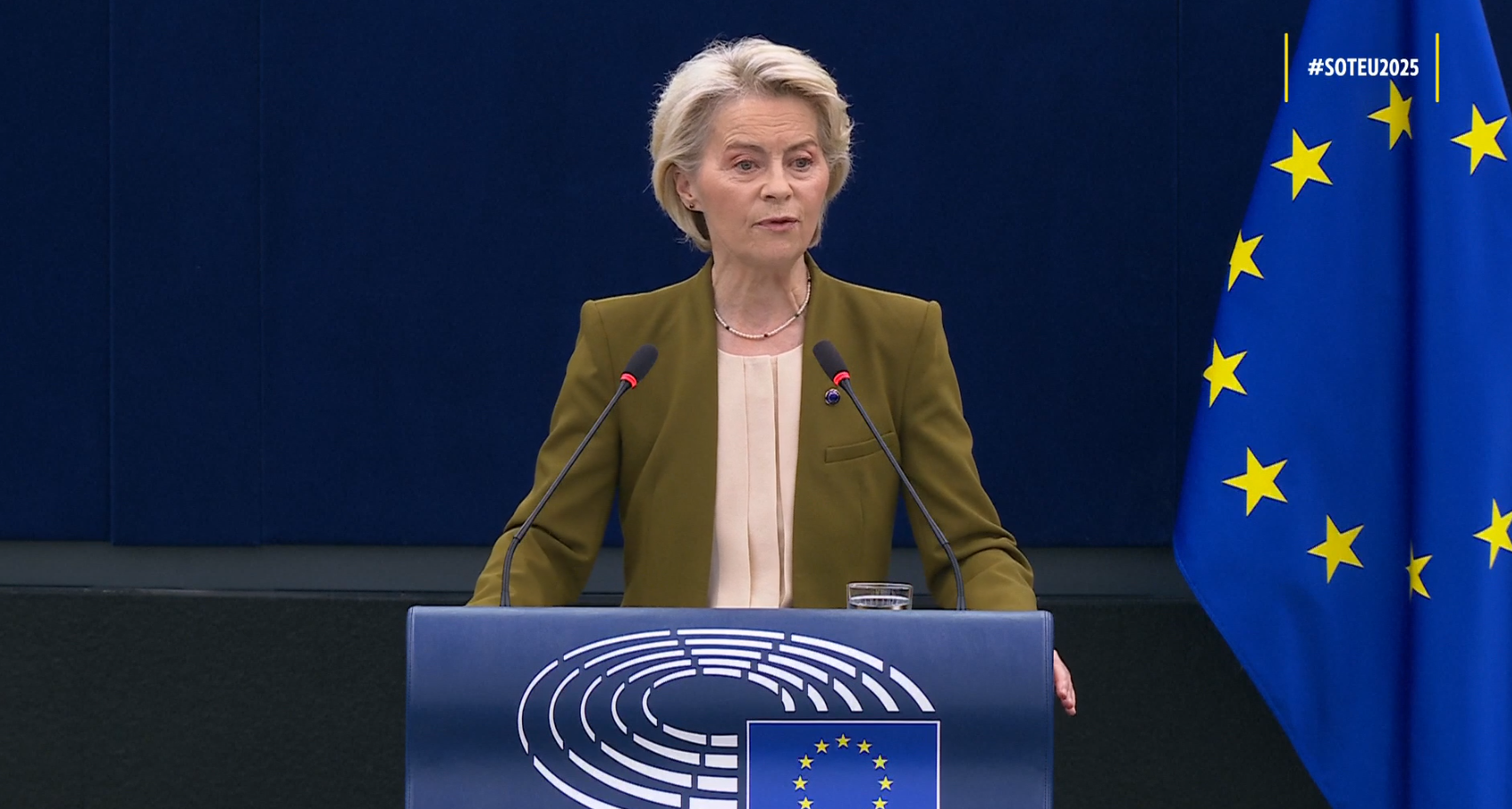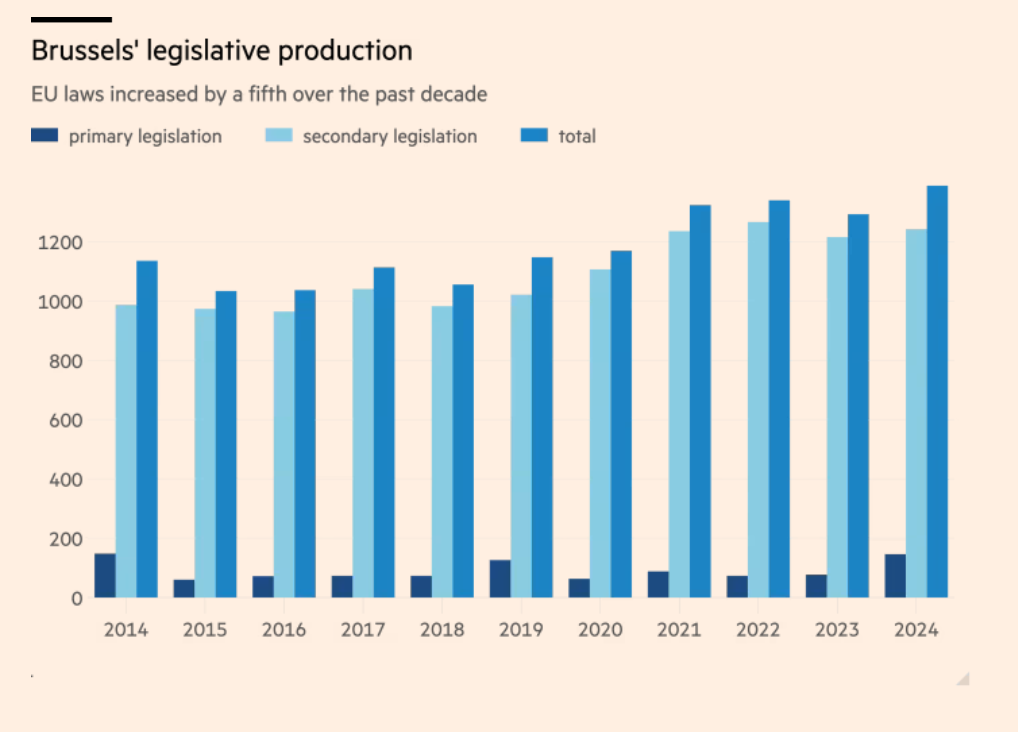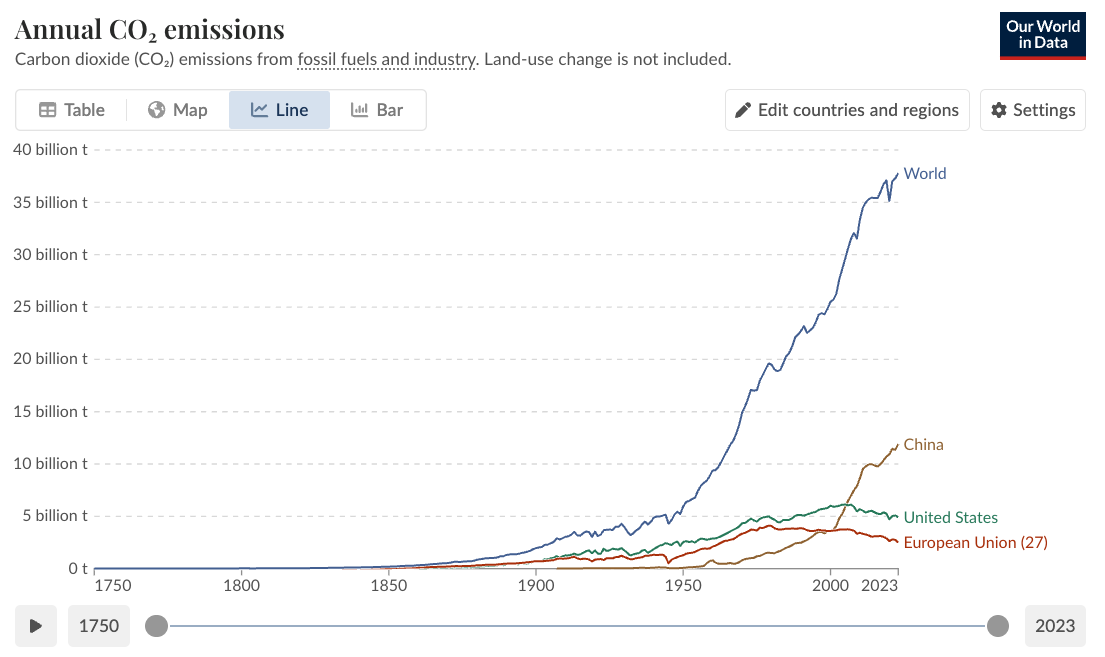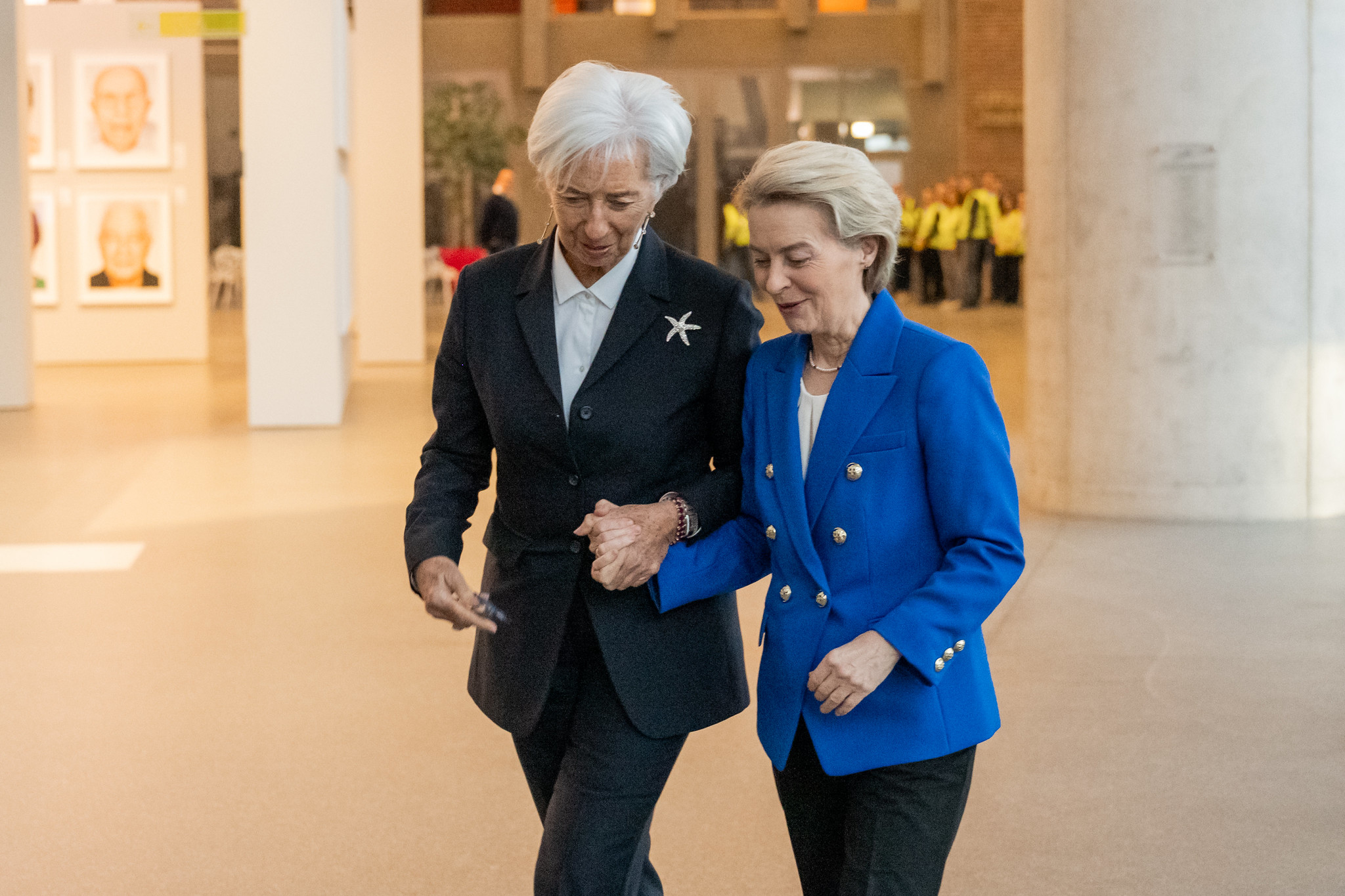9.3
8.064 reviews

English
EN
This article has been automatically translated from Dutch. Click here to see the orginal article including all links to sources.
In a week of a historic price breakout for gold, a new all-time high in euros for silver, Russian drones, and a political assassination in the United States, something else was easily snowed under. Yet it merits our attention: Ursula von der Leyen and Christine Lagarde laid out, in speeches, their political and economic vision for Europe. Since you’re unlikely to carve out 73 minutes for the speech of a not-democratically-elected EU leader, we did it for you. What does Ursula von der Leyen’s dreamed-of EU look like?
This past Wednesday it was time again for Ursula von der Leyen’s “State of the Union,” an annual speech whose idea is borrowed from the U.S., where the democratically elected president addresses the legislature each year. This year, she opened with “Europe is in a fight.”

Ursula von der Leyen during her speech (source: European Commission)
Von der Leyen argued that the front lines of a new world order are being drawn now. “So yes, Europe must fight,” the Commission President said. “This must be Europe’s independence moment,” she added. By independence she means, unsurprisingly, above all unity: unity between member states, institutions, and pro-European forces. Everyone aligned—and with urgency.
This warlike rhetoric isn’t only about defence, though new steps toward a common EU force are indeed mentioned. Von der Leyen refers, among other things, to €800 billion in defence investment and the creation of a “drone wall” along the eastern border. In Brussels, the realisation seems to have dawned that the economy and competitiveness are crucial. Von der Leyen stresses: “Europe’s independence will depend on its ability to compete in these turbulent times.”
In her speech she notes that Europeans are struggling with the high cost of living, rising house prices and high energy bills. She also emphasises that Europe must retain critical industries to safeguard jobs and competitiveness. But is she taking the steps needed to solve these problems?
“Is the EU really serious about fixing its economic competitiveness?” the Financial Times wrote. The European economy is stagnating, while the U.S. economy grew eight times as fast as the EU’s in the second quarter of 2025. Former ECB President Mario Draghi presented a report a year ago on the EU’s economic malaise. According to the paper, little has been done since: “Only just under 10 percent of Draghi’s recommendations have been implemented.” They also note that despite the rhetorical focus on economic reform, there’s little concrete progress.
The production of new EU legislation increased by one-fifth over the past decade (source: Financial Times).
According to Deutsche Bank, most progress has been made in the areas of least resistance. “So far we would not describe as game changers any of the proposals that they have done,” a senior Deutsche Bank economist told the FT. Von der Leyen increased legislative output in her first term by 17 percent compared with her predecessor. In her speech she says she wants to make a real difference: “Less paperwork, less overlap, fewer complex rules.” But how credible is that coming from her?
Anyone who listens to her speech can hardly avoid the conclusion that the EU wants to involve itself in more areas—and expand further. According to Von der Leyen, the Union should not only enlarge to include Ukraine, Moldova and the Western Balkans, but also expand its remit. We already mentioned defence, but Brussels also wants to fight poverty and fix the housing market. And because, in Von der Leyen’s view, climate change is increasing the number of forest fires, she’s even announcing a European “firefighting hub” in Cyprus. In addition, she wants, in a number of areas—including foreign policy—to take away member states’ veto and switch to qualified-majority voting.
The most telling evidence of the implausibility of her promise to tackle the flagging economy, competitiveness and growing bureaucracy is her advocacy of a “European e-car.” Like a sort of communist leader, she declares that Europe needs its own electric car with criteria set by Brussels. Arno Wellens writes: “Civil servants do not innovate—nor do unelected autocrats.”
Lex Hoogduin likewise questions why the European Commission should be getting involved in this and warns of a course toward centralist industrial policy and further expansion of Brussels’ power. “The EU is overreaching/is in the process of overreaching with all these centralist initiatives. It expects salvation from government and assumes a high degree of makeability of economy and society,” says Hoogduin. He stresses this should be the main theme of the Dutch elections. Earlier we discussed the pitfalls of this “makeability” mindset with Andreas Kinneging.
When it comes to high energy costs, it is also doubtful whether the EU will really take steps, even though Von der Leyen acknowledged the importance. She is in fact doubling down on the climate targets, while the rest of the world is not—and Europe accounts for only a small share of global CO₂ emissions. We must get rid of “dirty Russian fossil fuels,” Von der Leyen said, even though they are cheap. As we also discussed with Han de Jong, in countries where a larger share of the energy mix comes from green sources, energy prices are often higher. Still, there does seem to be a positive development: Von der Leyen explicitly designates nuclear power as “baseload.”

Global CO₂ emissions (source: Our World in Data)
Von der Leyen wants the EU to gain more grip over the information space: Brussels must be able to monitor and combat mis- and disinformation centrally. She says we are at the beginning of a global health crisis, fuelled in part by disinformation about vaccinations. She wants a European Democracy Shield against mis- and disinformation; in this way Brussels can grow into a kind of referee of truth. She also wants the EU to directly finance “independent” media companies far more. In addition, following the Australian example, a proposal is coming to bar children from social media.
Lagarde and Von der Leyen symbolically hand in hand earlier this year (source: ECB)
Christine Lagarde, President of the ECB, called on European governments this week “to rapidly establish the legislative framework for the potential introduction of our digital euro.” This call appears to confirm earlier rumours of an accelerated timeline for the digital euro. Von der Leyen also mentioned the digital euro in her speech. Both leaders stressed that the “Savings & Investments Union” (SIU) must be completed at pace; Lagarde also explicitly mentioned the banking union. With the SIU, Brussels wants to link your savings to what it sees as the most productive investments.
Conspicuously absent from Von der Leyen’s speech were the worsening debt problem and the rising costs of the welfare state—the elephant in the room. We recently wrote at length about the French crisis, which seems to have no way out. She did, however, find time to pat herself on the back over her trade deal with Trump—one many experts branded a fiasco. Von der Leyen is known for her closed style of governance and ultra-centralised approach. In this speech, again, she shows little regard for the principle of subsidiarity.
If, after reading this weekly selection, you have little confidence in her and her plans to make Europe competitive again, you unfortunately have little direct influence over that: you cannot vote her out. That does not mean all her plans will automatically become reality. According to Politico, the European Parliament is deeply divided and Von der Leyen is under heavy pressure. Political groups that for decades were accommodating toward centre-right Commission presidents are now questioning that loyalty. A motion of no confidence is even being prepared. To be continued!
